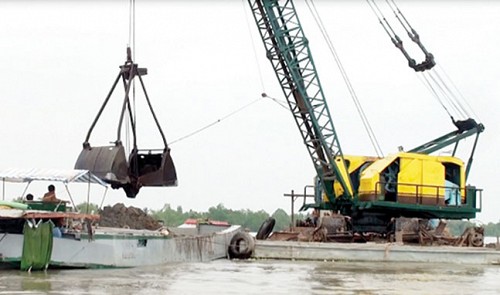Sand mining meets with public outrage in Vietnam’s Mekong Delta

The Hau River is one of the two tributaries of the Mekong River, starting from Phnom Penh, Cambodia, and running through the Vietnamese provinces in the Mekong Delta region.
For the past two months, locals living on the banks of the river in Vinh Long Province have been keeping a watchful eye on sand miners given worsening land submersion caused by the activity.
Bui Van Trieu, who lives in Phu Thanh Ward in Vinh Long, where the sand mining takes place, said local residents have been ambushing the barges used for mining sand in the tributaries of the river since the beginning of 2016.
“At first, we thought they were just a bunch of sand pirates who would go away after a few shipments. It was not until they took away a dozen barges of sand that we reported the incident to ward officials, who said that the sand miners had been authorized by the provincial authorities,” a local said.
Tuoi Tre (Youth) newspaper journalists who followed local residents to the mining site reported seeing a barge scooping sand from the riverbank onto its load.
As local people approached the barge to confront the miners, those on board appeared indifferent and unmoved, only saying they worked for a man named “Chin Ha.”
Police arrived at the scene nearly an hour later, only to retreat after calling a superior for directions, without checking the operating license of the miners.
Local people riding on motorized sampans showed the reporters metal bars they had prepared beforehand, saying, “We have got everything prepared. If they push it, we won’t back away anymore.”
Speaking to the reporters, Tran Vinh Ha, chairman of Tan Binh Minh Cooperative, the operator of sand mining activities on the Hau River, said his cooperative had been licensed by the provincial People’s Committee to mine sand at the My Hoa-Phu Thanh sand mine for six years.
However, Ha said, when the cooperative brought equipment to the site to start mining on February 15, they met with objection and interference by local residents, so the operation had to be halted.
After a dialogue among the cooperative, the authorities, and the people took place on March 10, the mining operation was still obstructed by locals, Ha said.
“They didn’t let us take the sand, and even threatened to set fire to the barges, so we had no choice but to retreat,” Ha explained, adding, “we still haven’t resumed the operation yet. We are losing billions of VND in mining fees alone.”
However, as the Tuoi Tre reporters found, local residents have reported catching illegal miners red-handed at the authorized sand mines as well, who were later charged VND16 million (US$715) for the operation.
Vo Van Dau, 61, said excessive sand mining in the area has led to serious land subsidence even in areas where there used to be accretion.
Dau said he and local people had used tree trunks and sand bags to fortify the riverbank, but their fortification mysteriously disappeared shortly after.
Residents who use riverside lands to farm fish have also had to sell their fish prematurely, fearing that soil erosion would sweep away all their aquaculture properties.
“Not only do authorized miners exploit the banks to their full extent, but illegal ones also sneak in to have their share, turning our once peaceful land into a constant fear of land submersion,” a local resident said.
What the stars mean:
★ Poor ★ ★ Promising ★★★ Good ★★★★ Very good ★★★★★ Exceptional
Latest News
More News
- Congratulations from VFF Central Committee's int’l partners to 14th National Party Congress (January 25, 2026 | 09:46)
- List of newly-elected members of 14th Political Bureau announced (January 23, 2026 | 16:27)
- 14th Party Central Committee unanimously elects To Lam as General Secretary (January 23, 2026 | 16:22)
- List of members of 14th Party Central Committee announced (January 23, 2026 | 09:12)
- Highlights of fourth working day of 14th National Party Congress (January 23, 2026 | 09:06)
- Press provides timely, accurate coverage of 14th National Party Congress (January 22, 2026 | 09:49)
- Press release on second working day of 14th National Party Congress (January 22, 2026 | 09:19)
- Minister sets out key directions to promote intrinsic strength of Vietnamese culture (January 22, 2026 | 09:16)
- 14th National Party Congress: Renewed momentum for OVs to contribute to homeland (January 21, 2026 | 09:49)
- Party Congress building momentum for a new era of national growth (January 20, 2026 | 15:00)
















 Mobile Version
Mobile Version